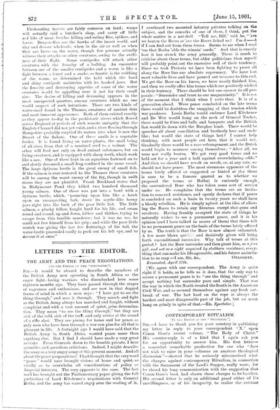LETTERS TO THE EDITOR.
THE ARMY AND THE PEACE NEGOTIATIONS.
ITO THE EDITOR 05 THE "SPECTATOR:']
SIR,-It would be absurd to describe the members of the British Army now operating in South Africa as the eager fight - loving warriors who disembarked here some eighteen months ago. They have passed through the stages of eagerness and enthusiasm, and are now in that dogged frame of mind in which a man says : " I have got to see the thing through," and sees it through. They march and fight as the British Army always has marched and fought, without complaint and with a vast amount of qUiet, grim determina- tion. They mean "to see the thing through," but they are sick of the veld, sick of the trelt, and only revive at the sound of a rifle shot. They are pining for home and for peace, as only men who have been through a war can pine for all that is pleasant in life. A fortnight ago I would have said that the British Army in South Africa wanted peace more than anything else. But I find I should have made a very great mitake. From Generals down to the humble private, I hear grumbles and querulous criticisms. Indeed, I might describe t lie army as a very angry army at this present moment. And all about the peace proposals too! I had thought that the very word "peace" would have brought visions of home and quiet. so vividly as to overwhelm all considerations of policy or Ithperial interests. The very opposite is the case. The last mail has brought out the Parliamentary paper giving the full particulars of Lord Kitchenefs negotiations with General Botha, and the army has waxed angry over the reading of it.
I overheard two mounted infantry privates talking On the subject, and the remarks of one of them, I think, put the
whole matter in a nutshell: "Tell me, Bill," said he, "'ave we beaten the Boers or 'ave the Boers licked us ? I'm d---41 if I can find out from them terms. Seems. to me when I read 'em that Botha 'olds the winnin' cards." And that is exactly how it has struck the army generally. There is much to criticise about these terms, but abler politicians than myself will probably point_ out the excessive evil of their tendency. Since we took Pretoria we have been fighting to prove all along the Boer line our absolute supremacy. We have lost most valuable lives and have poured out treasure to this end. We get the Boer on his knees, we have nearly finished him, and then we coolly offer him terms which are positively wicked in their leniency. There should be but one answer to all pro- posals : " Surrender and trust to our magnanimity." It is out of the moment that I think when I write thus. It is of a generation ahead. Were peace concluded on the late terms there would be doubtless the snapping of that tension which war produces. Louis Botha would embrace Lord Kitchener and De Wet would hang on the neck of General Tucker, there would be fetes and balls and banquets and the British lion would lie down with the Burgher lamb. There would be speeches all about conciliation and brotherly love and such- like ; but would the state of things last ? I cannot help thinking, with most people out here, that it would not. Gradually there would be a race estrangement, and the Dutch would begin to murmur among themselves: "After all, we were not really beaten. We got very good terms and we held out for a year and a half against overwhelming odds." And then we should have revolt on revolt, or, at any rate, we should not have peace. The most strenuous opponent of the terms lately offered or suggested or hinted at (for there is sure to be a famous quarrel as to whether we proposed the terms or Botha) is curiously enough the surrendered Boer who has taken some sort of service under us.. He complains that the terms are an invita- tion to renewed resistance, and openly declares that if peace is concluded on such a basis in twenty years we shall have a bloody rebellion. He is simply aghast at the idea of allow. ing the Boers to retain any firearms except shot-guns and revolvers. Having frankly accepted the state of things, he naturally wishes to see a permanent peace, and it is his opinion (and I have talked to scores of them) that there will be no permanent peace on the basis of the terms lately offered by us. The truth is that the Boer is now almost exhausted. A few more blows quick: and decisively given will bring forth unconditional surrender. Why talk of terms at this period ? . Let the Boer surrender and then grant him, as a free gift, and not as a right acquired by stubborn resistance, every- thing that can make his life agreeable, and his future assimila-
tion to us easy.—I am, Sir, &c., ONLOOKER. Kroonstad, April 27th.
[We agree with our correspondent. The Army is quite right if it holds, as he tells us it does, that the only way to secure a permanent peace is to " see the thing through" and accept nothing but surrender pure and simple. That was the way in which the North treated the South in the American Civil War, and so secured themselves against any fresh out- break of war. The last haul on the rope is always the hardest and most disagreeable part of the job, but we must hang on grimly in spite of that.—ED. Spectator.]










































 Previous page
Previous page